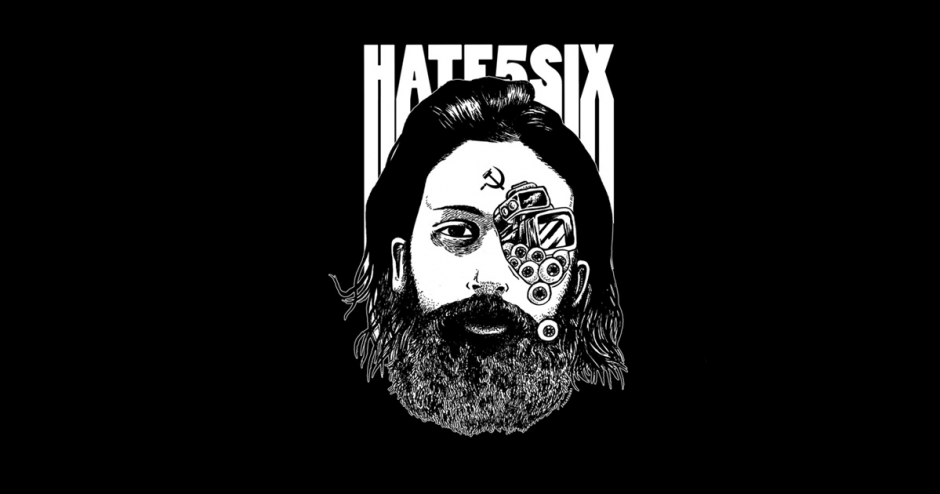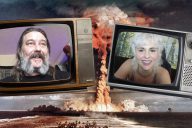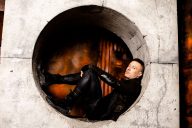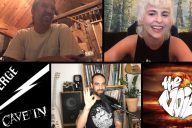The Void Podcast Ep #64: Sunny Singh of Hate5Six on Filming 3,000 Live Hardcore Gigs and Using Patreon To Make Killer Content Free Forever
By christina · On November 22, 2018This week’s guest on The Void with Christina podcast is Sunny Singh, a filmmaker who has been capturing the live hardcore music experience on film for over a decade with his channel, Hate5Six. With an arsenal of over two thousand high quality live performance videos online, Sunny has invested thousands of hours in shooting, editing and broadcasting killer hardcore bands in their element – live and dangerous.
In this in-depth 90 minute podcast interview conversation, Sunny chats to host Christina Rowatt about his history, hardcore music, Rage Against The Machine, his experience as a one man band, art as a defiant response to the corrupt systems of late capitalism, the emotional feedback loop of live music and the decision to launch the Hate5Six Patreon in 2018, which has allowed him to make Hate5Six a full-time job.
Listen on Apple Podcasts | Listen on Spotify Podcasts
Sunny Singh doesn’t just wield his camera like a weapon; he also deftly utilises his nefarious computer science ninja skills earned through his longtime day job as a software developer to turn the Hate5Six crowdfunded Patreon experience into a cutting edge experiment in freely available punk rock, 21st century tech and raw, visceral expression. The revolution will be televised, and democratised, and FREE. 21st century MTV sold the fuck out and their trash reality shows will be relegated to the scrap heap of history. With Hate5Six, Sunny proves that we the people, on the stage and on the floor, won the war of music television. Video may have killed the radio star, but you can’t kill Hate5Six (Sunny’s server is too bulletproof). It is all of ours, forever. And this is just the beginning. Listen to the podcast on Apple Podcasts. Listen & subscribe to the podcast on Spotify. Watch Hate5Six on YouTube and Join the Patreon.
Christina: The first show you ever filmed was in December 22nd 2001. If you lived in New Jersey, New York that is a fairly significant moment in time, just after 9/11. The world was feeling different, after it. Do you feel that in that point of time that there was a different vibe?
Sunny: It definitely was. And for listeners that don’t know who I am, I’m an American-born Indian. So I’m a brown-skinned man, with a big beard. So I was in high school and I remember right after 9/11 my dad pulled my brother and sister and I aside and was telling us that if we were ever pulled aside by any law enforcement, just to cooperate and answer questions and not cause any issues.
There was definitely tension in the air, and I had some incidents in high school related to it. There was definitely a change. Back then I was mostly filming small high school bands in the New Jersey punk scene. I’d heard that things were very tense and sort of sombre up in the New York hardcore scene, but I wasn’t privy to that given my age and where I was at the time. Looking back, it really does feel like a turning point that we haven’t yet recovered from fully.
Enjoy five intense Hate5Six YouTube performance videos in this Sunny-curated playlist.
Christina: I feel like it was the beginning of spreading this cult of fear and using it as a tool to start wars and justify wars. I think the hardcore community is a really important antidote to this because the thing that really pisses me off about growing up in this era and being in high school when all of that happened was that it is all fucking horseshit. The only battle is human interests vs. corporate interests.
Sunny: Yes.
Christina: People blaming immigrants, people blaming people of different religions or faiths … it is all a smokescreen, it is all diversionary tactics. The biggest problem in the world is corporations having more power than people. They don’t care about the climate, they don’t care about animals, they don’t care about taking care of us and the planet. There’s got to be an antithesis to this and hardcore is a community that is built on being inclusive. You’ve spent a lot of your life documenting this, what was it about that culture that spoke to you internally and did it relate to finding community at a time when things were getting weird?
Sunny: I think there are a couple of things that appealed to me. I really appreciated the flat hierarchy. You go to a show and the opening band is playing and the person next to you in the moshpit is someone in the headlining band. There was a sense of accessibility there that wasn’t really apparent to me when I was listening to stuff on the radio. When I turned the radio on in fifth grade and I hear Oasis or whatever … they’re so far removed, you know what I mean? I don’t mean to dehumanise them but they don’t feel real, they’re so intangible and so far away.
So when I started going to shows and I realised that anyone who wants to be a part of this community can as long as they put in the work, and the initiative. You can come up with any idea, and you can own it and you can master it. That was the first thing that appealed to me, the DIY [ethic]. Obviously there is cliques and social structures within it, but for the most part, its accessible. And people within it are accessible. That was a big thing for me.
I actually went to a talk over the weekend in New York and someone was talking about education in radical spaces and he [a professor of anarchist studies] was talking about how for him growing up the most significant education he got wasn’t in the classroom, it was through punk rock music and being in those spaces.
So I also just appreciated the fact that the hardcore/punk community (though its not always political) there is potential there for people to have significant and political discussions that you’re not necessarily going to see within a classroom or within everyday life. I really appreciated that as well. Thinking about punk as a radical space where people can exchange ideas through music, and whether its just talking about veganism, or police brutality or LGBTQ identity, things like that. And again – its not the case that every band is political, or has a message – but you are coming into that space where it is not uncommon to hear ideas like that being exchanged.
Christina: So the first Rage Against The Machine album has some of the most prophetic lyrics of our generation’s lifetime. I feel like that energy and that anger is our soul music; children of the late 20th century and late capitalism have a lot to be angry about. What do you think defines soul music for our generation?
Definitely now people are certainly becoming aware of the effects of capitalism and the political machine. We’re seeing more people becoming more vocal and engaged about what is going on in everyday life, and struggles that are happening in different communities. I’d like to think there is more momentum building around messages like that. A band like Incendiary or Jesus Piece has songs about police brutality and Black Lives Matter and I think that that elicits a very strong response from the crowd and people are becoming aware … even though the vast majority of hardcore punk may be white, they are beginning to recognise that this is a reality for people of colour.
For me, there are only so many songs you can sing about being stabbed in the back and breaking the chains. I would like to see more thought going into lyrics, it doesn’t have to be outwardly political about addressing a systemic issue. Even singing about your own depression or whatever, that’s also in a sense very political, because we’re not supposed to be talking about mental health. So I’m definitely drawn to lyrics that are meaningful – and again that is a very subjective thing, but when I am listening to a band, I can tell when its coming from a genuine place or not and I think that people have a really good bullshit detector now. and they can tell if someone is singing about something that they actually mean, versus something that they’re just … blowing smoke.
Popular Previous Podcasts:









